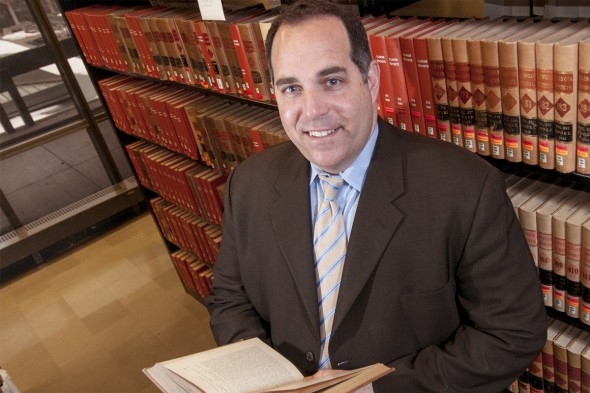David Williams revisits city’s infamous crimes

David Williams, adjunct professor of criminology, law and justice, teaches a popular class on the Chicago’s greatest trials and crimes. Photo: Joshua Clark
Any student drawn to Chicago’s most infamous crimes — and the high-profile trials that resulted — should enroll in David Williams’ course.
And many do.
“It’s full every year, and this year there’s a waiting list to get in,” said Williams, an adjunct lecturer in the criminology, law and justice department who started teaching the course three semesters ago.
“Great Chicago Trials and Crimes” examines 11 cases, leading off with the “murder castle” of H.H. Holmes, the killer of as many as 200 people in the late 1800s as depicted in Erik Larson’s Devil in the White City.
Williams then moves on chronologically to:
• the Haymarket Riot: a bombing, followed by gunfire, in which seven police officers and at least four civilians died, 1886
• the Black Sox scandal: eight White Sox players were banned from baseball for intentionally losing games — and the 1919 World Series — to the Cincinnati Reds
• Leopold and Loeb: two privileged youths who kidnapped and murdered a young boy, 1924
• Al Capone: Chicago’s best-known criminal, he headed the city’s crime syndicate during the Roaring Twenties
• Richard Speck: the slayer of eight student nurses in a dormitory, 1966
• Chicago 7 trial: the defendants were charged with conspiracy, inciting to riot and other charges related to protests during the 1968 Democratic National Convention
• Operation Greylord: an investigation of corruption in the Cook County judiciary during the 1980s
• Harry Aleman: a mob hit man, he murdered 13 men between 1971 and 1976 and died in prison in 2010
• George Ryan and Rod Blagojevich: recent Illinois governors sent to prison for their crimes.
Williams also finds time to look at “cold cases” — crimes that were never solved, including the Tylenol murders of seven people who took poisoned medicine in 1982; the 1977 disappearance of candy heiress Helen Brach; and the slaying of Valerie Percy, daughter of Sen. Charles Percy, in their Kenilworth home in 1966.
With each case, he wants students to ask questions:
“Is there a hero or a villain? Are there misunderstood characters? Looking back, was it a success or failure for the criminal justice system? Did the right thing happen?”
His favorite case is the Leopold and Loeb story.
“It’s got so many aspects at so many different levels, starting with two geniuses who believed they were above the law, trying to get away with the perfect murder,” Williams said.
“Clarence Darrow is in the mix. And it was one of the first cases that brought psychology into the courtroom. They actually tried to get Freud to testify, but he was too sick.”
The case “has got all the makings,” Williams said.
“The only thing it didn’t have is an actual trial. Darrow has them plead guilty to avoid the death penalty.”
Williams’ full-time job is prosecutor for the Cook County state’s attorney’s office, where he is deputy superintendent for public corruption and financial crimes and executive director of the regional organized crime task force.
He grew up in Arlington Heights and earned his bachelor’s degree at Urbana-Champaign.
Attending the London School of Economics, “I was interested in international political economics,” he said.
“Then I went to law school and quashed all other interests.” His law degree is from Boston College.
After three years with the state’s attorney, Williams spent 10 years with the U.S. Department of Homeland Security, returning to Cook County in 2010.
He lives in the Wicker Park neighborhood with his wife, Lisa, who works for the U.S. Justice Department.
“Chicago has so many great cases that had a profound effect on the American legal system or were infamous for either the crime or who the defendant was,” he said.
“Chicago is really a tapestry. Every case is a chance to learn something about the city and what’s involved with its history.”
